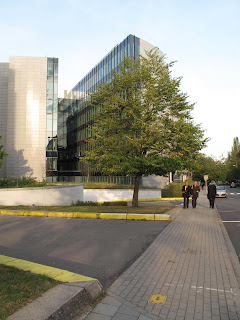 September 21th to 24th paid EC a visit due to the first external review of HANDS. I held a numb er of meetings with interesting officials being responsible for a part of the research policy of European Commision. I held meeting with project officer of HANDS, Giorgio Zoia, Joanna Namorado, technical project officer within the medicine area responsible for ethical approval and finally Peter Wintlev-Jensen, head of a research programme within HANDS' area and a dane.
September 21th to 24th paid EC a visit due to the first external review of HANDS. I held a numb er of meetings with interesting officials being responsible for a part of the research policy of European Commision. I held meeting with project officer of HANDS, Giorgio Zoia, Joanna Namorado, technical project officer within the medicine area responsible for ethical approval and finally Peter Wintlev-Jensen, head of a research programme within HANDS' area and a dane.All talks were very interesting but I have only given a resume of the last one. Peter Wintlev-Jensen sketched an outline of the demands to existing consortiums and future research applications. Demands that HANDS are targeting very well.
But first - business: the external review

The review is a vital part of the ECs quality initiatives. To me it was like AAU project evaluation with 3 examinators and 8 projectmembers, 8 hours and the whole Consortium budget at stake. We managed, had a good time and got minor numbers of extensions to existing deliverables. The HANDS participants were having a good spirit and the reviewers did, I believe, enjoyed that. We did.
8 hours is a long time and afterwards Miklos Gyori(ELTE University, Jaap Erasmus(Helen Allison School) and I went to a bar to enjoy our own compagny and talk about all the other HANDS issues. It was really nice.
Peter Wintlev – European Commisions strategy and technology considerations
Peter Wintlev-Jensen
The focus of our talk was for that reason Research strategy and the way EC collaborates with their external partners.
First of all he made the foundation for the ECs
interest in E-inclusion and Ageing is easily understandable: The European countries will within 5-10 years suffer from increasing extra costs in caretaking of the rapidly growing elderly population. And to that problem the labour market in all European countries will lack labour force. On the other hand the endavours of the Commision to create technological solutions to the challenges and the coming American health reform will establish a new market for healthcare technology.
The European Commission is given the task to find valuable technological solution to the problem and have a significant budget. A list of the ongoing FP7-projects have the E-inclusion department is downloadable here. It naturally includes HANDS J
We talked a lot – I believe 1 hour. And it was a great joy to me meeting a person “on the other side of the desk” being kind, qualified and amusing. In this posting I would explain only two important terms in ECs research strategy Open Platform and Mass customisation.
Mass customisation
Peter Vintlev-Jensen explained that the technological solutions should be adapted to the single elderly or disintegrated citizen in one way or the other. Preferably in an intelligent ambient way.
The need of customisation is in my opinion right and the identification of the tradeoff between the need for customisation and the citizens, the caretakers and the organisations ability to do the customisation is right too. In HANDS we do  identify the same tradeoff when applying the slogan “One for each”.
identify the same tradeoff when applying the slogan “One for each”.
But in Persuasive Technology the customisation can be viewed as a process that could be used for persuasive activities as well and give citizen and caretakers and opportunity to be aware of the goals and the needs for changes in behaviours that in many settings are needed when introducing new technology.
Open System Reference Architecture
As an integral part of the idea of mass customisation the various technological solutions should be embeddable with each other which will be mass communication on a component level. E.g. data from a component that measure brain activity should be embeddable with a diary about the citizens behaviour and the registration of medicin take.
Again I find it a valuable perspective on the research projects within e-inclusion. Unfortunately did I not interrogate the meaning of the Open Platform concept.
In two respects the concept is vague:
Technologically – are a Google solution with Open APIs the solution or are a service architecture of interest.
Business modelling – are EC considering Open source as business models or new and not yet developed models.
A description of the Open System Reference Architecture is found on workprogram-abstraction level here
It was obvious that Peter Wintlev-Jensen was aware that not only researchers and users should have a interest in the research project. But the industrial interest was crucial for the single research project as well as for overall EC strategy of development of welfare technologies.
E.g. at workshops about new E-inclusion it was valuable for EC to get indication of industrial interest in potential new calls.
In HANDS we experience the need for such integration and HANDS ought to be considered as such Open Platform component. The population for individuals with ASD is simply too small and varies too much. We would appreciate the ability to be combined and combine HANDS with sensor technology data.
















